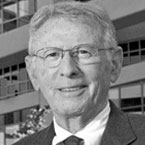
Paul Berg, PhD, a Nobel Prize-winning genetic engineer and a Fellow of the AACR Academy, died February 15, 2023, at the age of 96.
Berg was born June 30, 1926, in Brooklyn, New York. He earned a bachelor’s degree in biochemistry from Penn State in 1948 and his doctorate from Western Reserve University (known today as Case Western Reserve) in 1952. He conducted a postdoctoral fellowship with the American Cancer Society.
From 1955 to 1959, he was a professor at Washington University School of Medicine. He joined the faculty of the Stanford School of Medicine in 1959, where he helped create the school’s biochemistry department and served as chair of the Department of Biochemistry from 1969 to 1974. He helped establish Stanford’s Beckman Center for Molecular and Genetic Medicine, then served as its director from 1989 to 2000. He also helped raise significant funds for the Li Ka Shing Center for Learning and Knowledge.
Berg helped launch numerous other initiatives at Stanford, such as the Berg Scholars Program, which trains physician-scientists, and the Discovery Curriculum, which provides support for students pursuing long-term research. Most recently, he was the Vivian K. and Robert W. Cahill Professor of Cancer Research, emeritus.
Berg pioneered research involving recombinant DNA, in which DNA from multiple sources is combined. His work formed the foundation of modern genetic engineering. In 1980, he was awarded the Nobel Prize in Chemistry for his fundamental studies of the biochemistry of nucleic acids, including his groundbreaking work on recombinant DNA.
Berg frequently advocated for policies that would advance scientific research. Concerned about potential safety issues surrounding recombinant DNA, he paused his research and called for an international conference on the topic. In 1975, 100 scientists from 16 countries convened at Asilomar in Pacific Grove, California, and set a temporary moratorium on gene editing while experts further assessed safety. He later advocated for support for government funding for stem cell research.
Berg was inducted into the inaugural class of AACR Fellows in 2013. He was also an elected fellow of the American Association for the Advancement of Science and the American Academy of Arts and Sciences. He was a member of the National Academy of Sciences, the Institute of Medicine, the Royal Society of London, the American Philosophical Society, and the French Academy of Sciences.
He was recognized as the California Scientist of the Year in 1963; won the Gairdner Foundation International Award and the Albert Lasker Award for Basic Medical Research in 1980; the Scientific Freedom and Responsibility Award in 1982; the National Medal of Science in 1983; the National Library of Medicine Medal in 1986; and the Carl Sagan Prize for Science Popularization in 2006. He was honored twice with Stanford’s Henry J. Kaiser Award for Excellence in Teaching.
Leave your remembrance of Dr. Berg below (limit 1,000 characters).
Be the first to add a Remembrance.